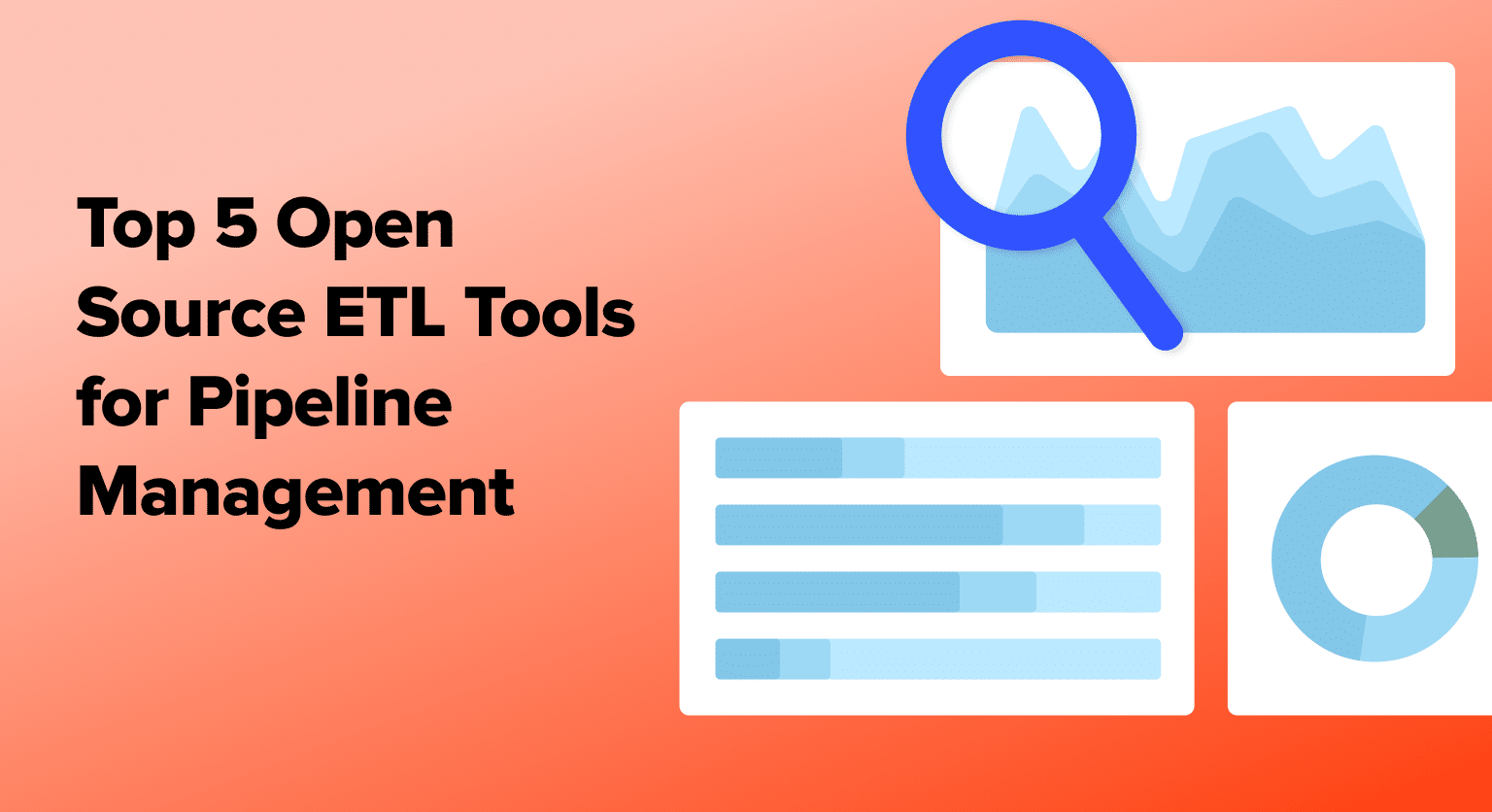Open source ETL (Extract, Transform, Load) tools have revolutionized data integration, offering cost-effective and flexible solutions for data professionals.
In this article, we’ll explore the top 6 open-source ETL tools for efficiently managing data integration workflows.
1. Hevo Data
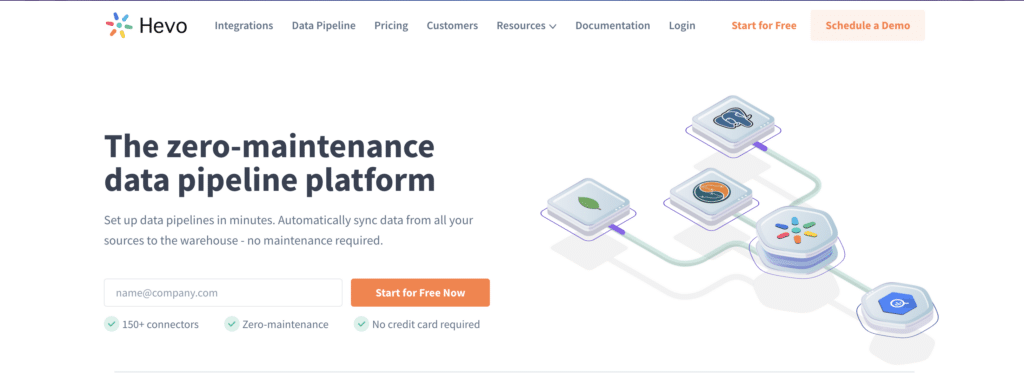
Hevo is a real-time ELT No-code Data Pipeline platform that cost-effectively automates data pipelines that are flexible to your needs. You can replicate data in near real-time from 150+ data sources to the destination of your choice, including Snowflake, BigQuery, Redshift, Databricks, and Firebolt.
For the rare times things do go wrong, Hevo ensures zero data loss. To find the root cause of an issue, Hevo also lets you monitor your workflow so that you can address the issue before it derails the entire workflow. Add 24*7 customer support to the list, and you get a reliable tool that puts you at the wheel with greater visibility.
Hevo Data ETL Features
- Data Deduplication: Hevo deduplicates the data you load to a database Destination based on the primary keys defined in the Destination tables.
- Schema Management: Hevo takes away the tedious task of schema management & automatically detects the schema of incoming data and maps it to the destination schema.
- Data Transformation: Hevo supports Python-based and drag-and-drop Transformations to cleanse and prepare the data to be loaded to your Destination.
- Incremental Data Load: Hevo allows the transfer of data that has been modified in real-time. This ensures efficient utilization of bandwidth on both ends.
Use Cases:
- Data Integration Across Multiple Sources
Hevo Data enables seamless integration of data from diverse sources (databases, SaaS apps, cloud storage) into a unified destination, helping businesses make data-driven decisions. - Real-Time Analytics and Reporting
By streaming data in real-time, Hevo allows companies to perform up-to-the-minute analysis, helping teams gain insights quickly and act promptly.
Pros:
- No-Code Platform – Hevo’s no-code setup simplifies data workflows, making it accessible for non-technical users to integrate and manage data efficiently.
- Real-Time Data Processing – Hevo supports real-time data sync, ensuring that businesses have access to the most current data for decision-making.
Cons:
- Limited Advanced Customization – While easy to use, Hevo may not provide advanced customization options that some technical teams require.
- Pricing for Smaller Businesses – Hevo’s pricing model may be challenging for smaller businesses or startups with limited data budgets.
2. Talend – Powerful Data Integration Platform
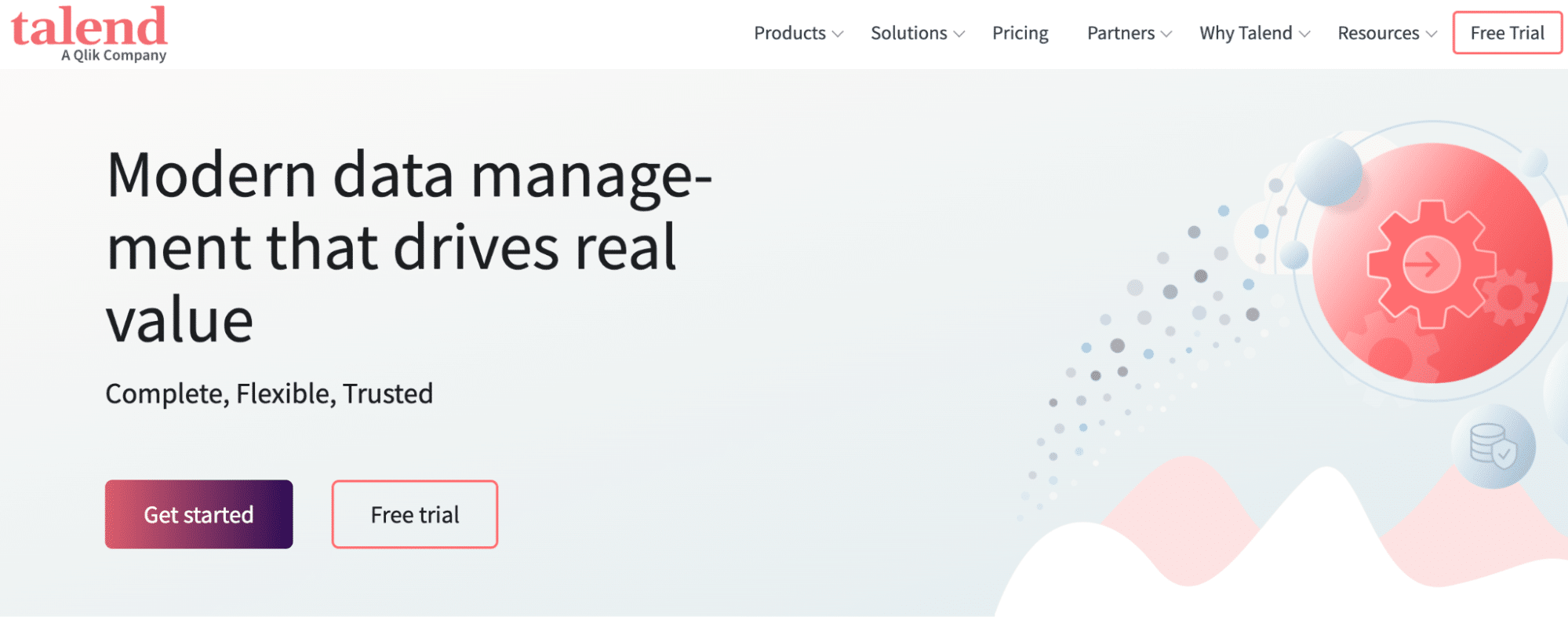
Talend is a comprehensive open-source data integration platform that offers a wide range of tools for ETL, data quality, and data governance. Its intuitive graphical interface and drag-and-drop functionality make it accessible to users with varying technical skills.
Talend provides a unified platform for data integration, quality, and governance, making it a one-stop solution for data management needs.
Key Features:
- Graphical user interface for designing and managing ETL jobs
- Support for a wide range of data sources and destinations
- Built-in data quality and data profiling capabilities
- Integration with big data technologies like Hadoop and Spark
Use Cases:
- Data warehousing and business intelligence
- Data migration and synchronization
- Big data integration and processing
Pros:
- Comprehensive data integration capabilities
- User-friendly interface for ease of use
- Strong community support and extensive documentation
Cons:
- Steeper learning curve compared to simpler ETL tools
- Some advanced features are only available in the paid enterprise edition
3. Singer – Lightweight and Extensible ETL Framework
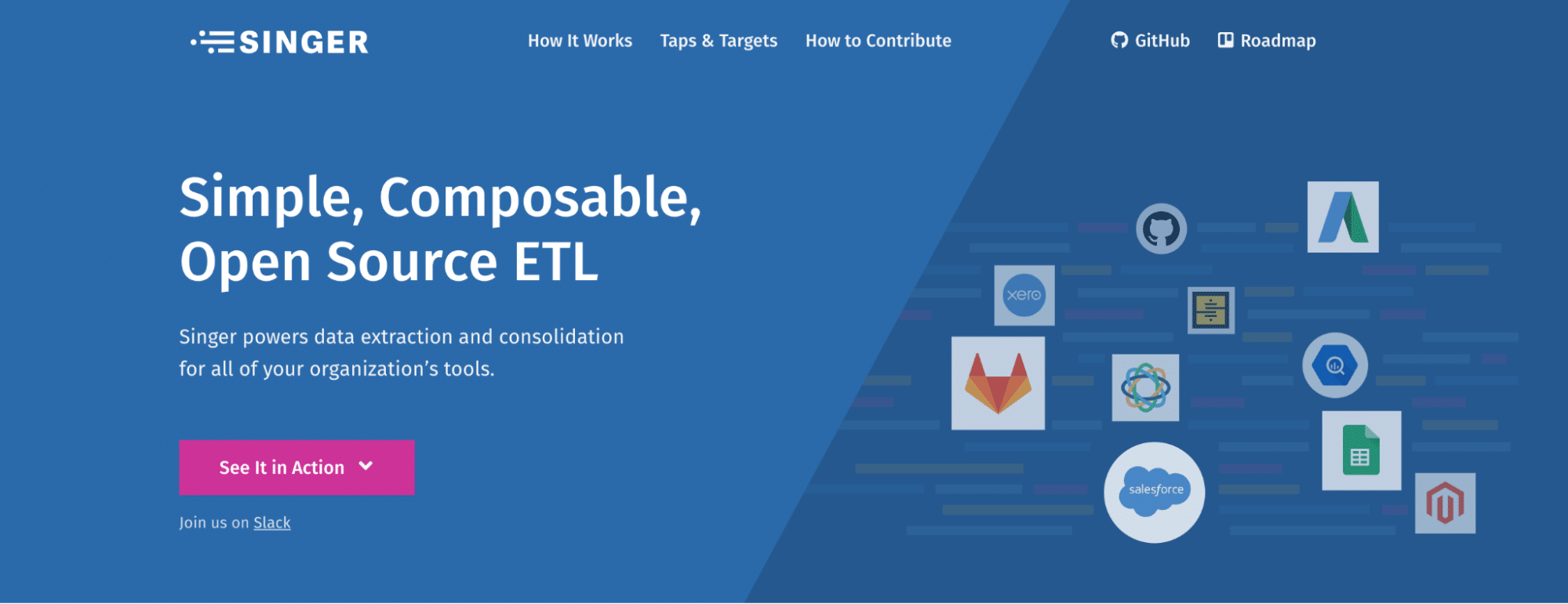
Singer is a simple, open source ETL framework that focuses on modularity and extensibility. It provides a standardized way to write data integration scripts, making it easy to create and maintain ETL pipelines.
Singer’s modular architecture allows users to choose and combine different “tap” and “target” components, providing flexibility in building ETL pipelines.
Key Features:
- Decoupled architecture with separate “tap” and “target” components
- Standardized JSON-based data format for easy interoperability
- Extensive library of pre-built taps and targets
- Ability to create custom taps and targets using any programming language
Use Cases:
- Data extraction from various sources (databases, APIs, files)
- Data loading into different destinations (data warehouses, analytics platforms)
- Building custom data integration pipelines
Pros:
- Lightweight and easy to set up
- Modular architecture for flexibility and extensibility
- Growing community and ecosystem of taps and targets
Cons:
- Limited built-in data transformation capabilities
- Requires some coding skills to create custom taps and targets
4. Pentaho – Comprehensive Business Intelligence and ETL Platform
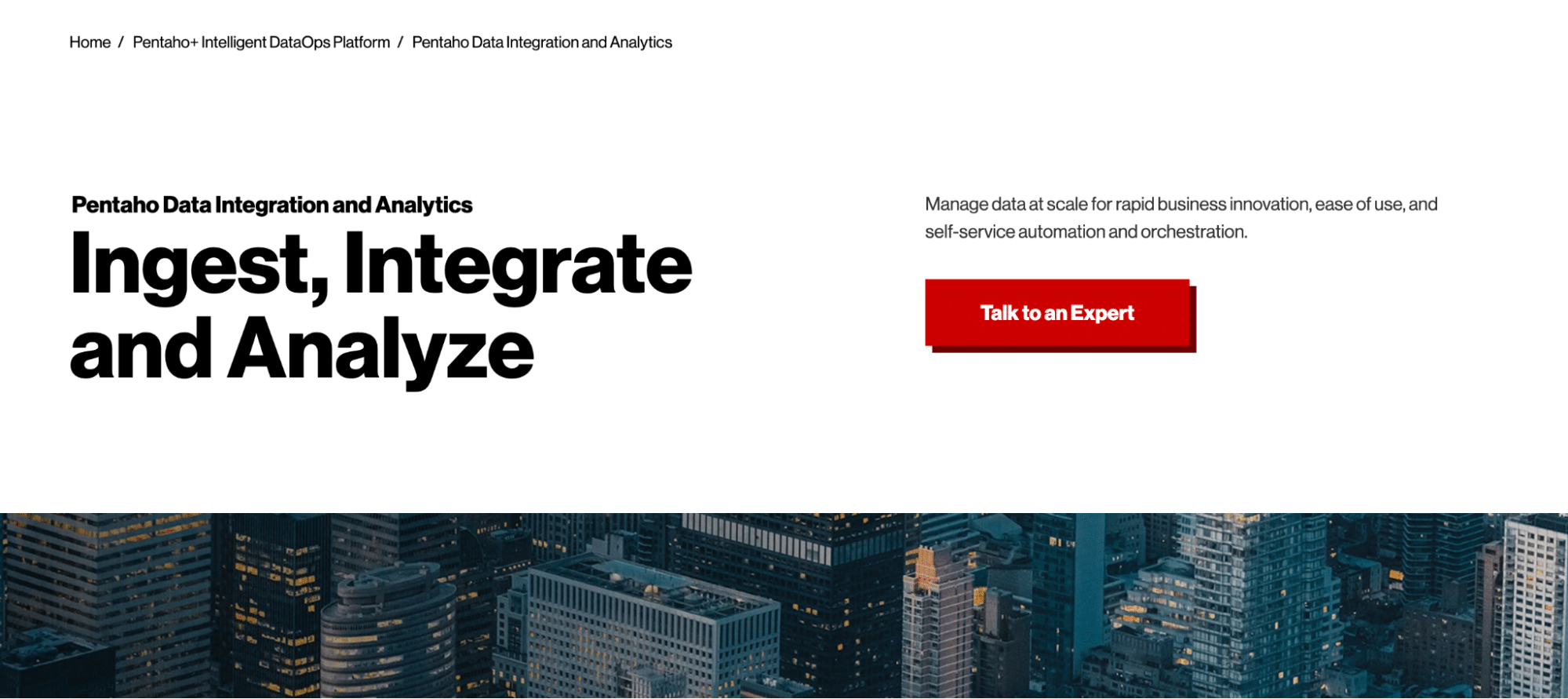
Pentaho is an open-source business intelligence (BI) and ETL platform that provides a complete suite of tools for data integration, analysis, and visualization. It offers a user-friendly graphical interface for designing and managing ETL workflows.
Pentaho’s comprehensive feature set and extensive community support make it a popular choice for organizations looking for a robust open-source BI and ETL solution.
Key Features:
- Drag-and-drop graphical interface for ETL design
- Support for a wide range of data sources and destinations
- Built-in data transformation and cleansing capabilities
- Integration with big data technologies like Hadoop and Spark
Use Cases:
- Data warehousing and business intelligence
- Data migration and consolidation
- Big data integration and analytics
Pros:
- Comprehensive BI and ETL capabilities in a single platform
- User-friendly interface for ETL design and management
- Strong community support and extensive documentation
Cons:
- Steeper learning curve compared to simpler ETL tools
- Some advanced features may require additional configuration or plugins
5. Airbyte – Declarative ETL Framework for the Modern Data Stack
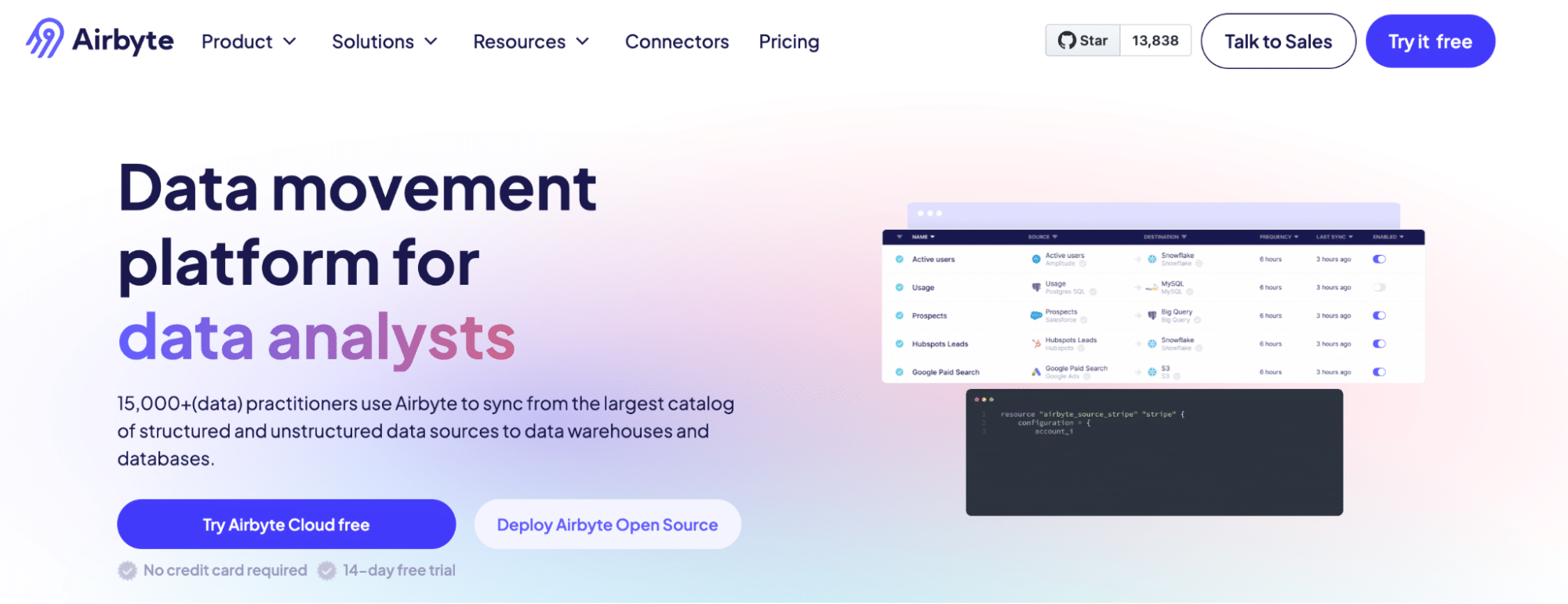
Airbyte is a declarative open source ETL framework designed to address the challenges of data integration in the modern data stack. It provides a simple yet powerful approach to building and managing ETL pipelines.
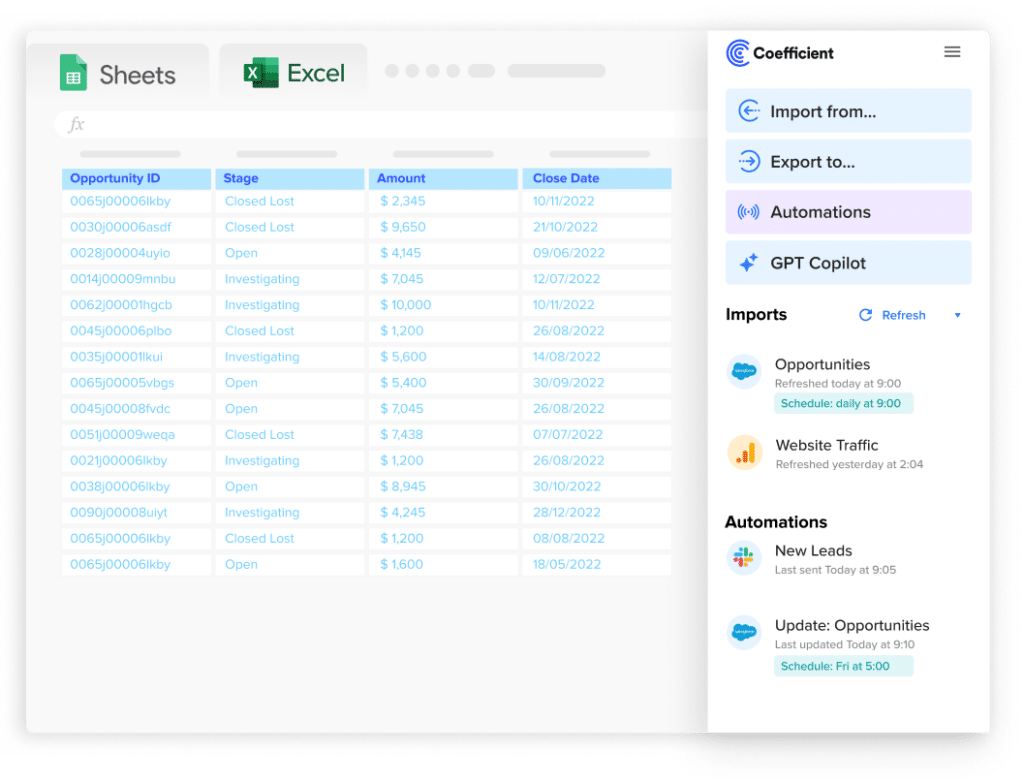
Stop exporting data manually. Sync data from your business systems into Google Sheets or Excel with Coefficient and set it on a refresh schedule.
Get Started
Airbyte simplifies ETL configuration and management with a declarative approach using YAML files. It seamlessly integrates with modern data stack components like dbt and Airflow.
Key Features:
- Declarative configuration using YAML files
- Support for a wide range of data sources and destinations
- Integration with modern data stack tools like dbt and Airflow
- Built-in data normalization and transformation capabilities
Use Cases:
- Building ETL pipelines for modern data stack architectures
- Integrating data from various sources into data warehouses and lakes
- Leveraging dbt for data transformation and modeling within ETL workflows
Pros:
- Declarative configuration for simplified ETL development
- Seamless integration with modern data stack tools
- Leverages the power of dbt for data transformation
Cons:
- Relatively new project compared to more established ETL tools
- Limited pre-built connectors compared to other ETL platforms
6. Meltano – Open Source DataOps Platform
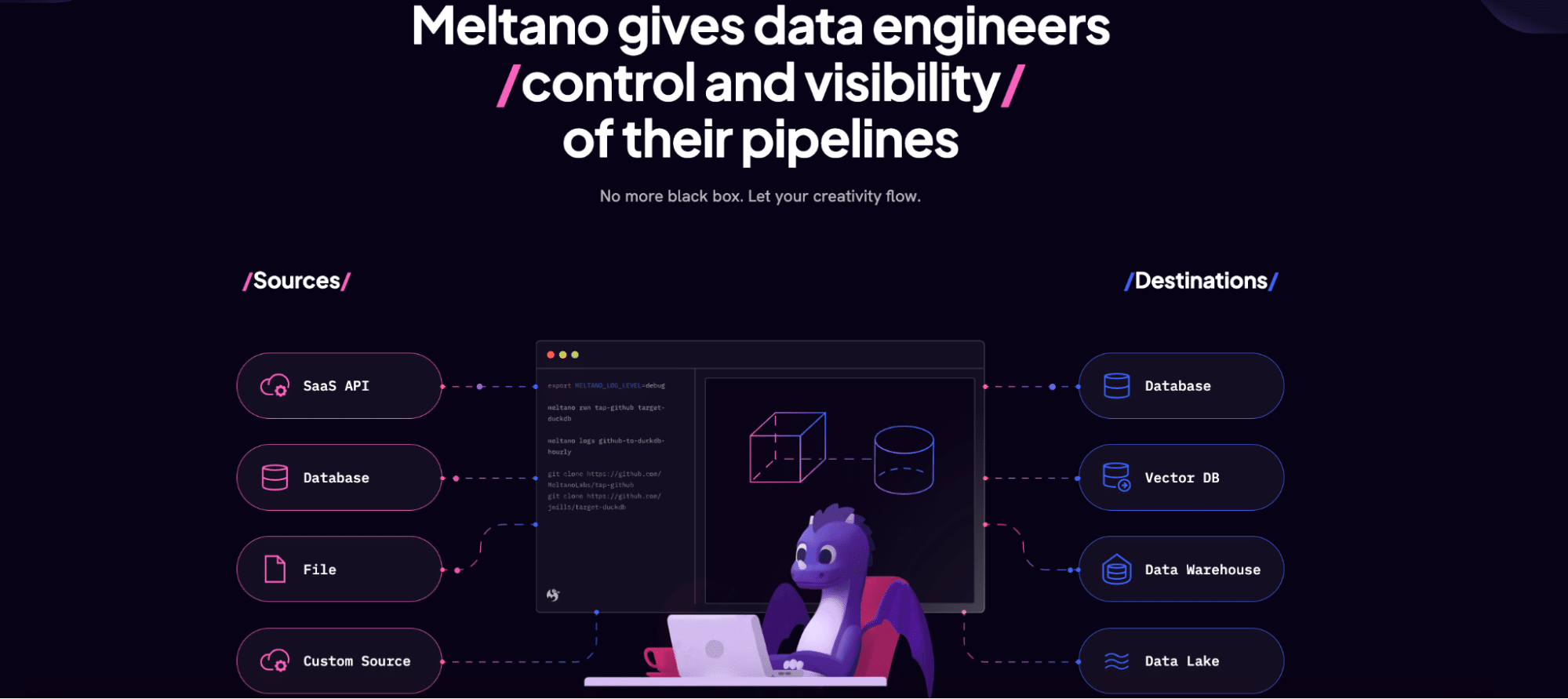
Meltano is an open-source DataOps platform that combines ETL, data analysis, and data orchestration capabilities. It provides a unified framework for managing the entire data lifecycle, from extraction to analysis and reporting.
Meltano offers a complete DataOps platform for end-to-end data management, enabling data teams to collaborate and manage data workflows effectively.
Key Features:
- Integrated ETL, data analysis, and orchestration capabilities
- Extensible plugin system for adding data connectors and tools
- Built-in support for popular data sources and destinations
- Integration with data orchestration tools like Airflow and Kubernetes
Use Cases:
- Building end-to-end data pipelines from extraction to analysis
- Orchestrating and managing complex data workflows
- Enabling collaboration and version control for data projects
Pros:
- Comprehensive DataOps platform for end-to-end data management
- Extensible plugin system for flexibility and customization
- Integration with popular data orchestration tools
Cons:
- Steeper learning curve due to the broader scope of the platform
- Requires familiarity with DataOps concepts and practices
Comparison Table: Open Source ETL Tools
| Feature | Talend | Singer | Pentaho | Airbyte | Meltano |
| GUI for ETL Design | Yes | No | Yes | No | Yes |
| Pre-built Connectors | High | Medium | High | Medium | Medium |
| Data Transformation | High | Low | High | Medium | Medium |
| Orchestration Support | Yes | No | Yes | No | Yes |
| Pricing | Freemium | Free | Free | Free | Free |
| Target Audience | Enterprises | Developers | Enterprises | Data Engineers | Data Teams |
How to Choose the Right Open Source ETL Tool
When selecting an open source ETL tool, consider the following factors:
- Data sources and destinations: Ensure the tool supports the data sources and destinations you need to integrate.
- Data transformation capabilities: Assess the tool’s built-in data transformation features and see if they meet your requirements.
- Ease of use: Consider the learning curve and whether the tool provides a user-friendly interface for designing and managing ETL workflows.
- Integration with existing tools: Check if the tool integrates well with your existing data stack components, such as data warehouses, analytics platforms, and orchestration tools.
- Community support and documentation: Look for tools with active communities, regular updates, and comprehensive documentation to ensure you have access to resources and support when needed.
Streamline Your Data Integration with the Right Open Source ETL Tool
Choosing the right open source ETL tool is crucial for efficiently managing your data integration workflows. By evaluating the features, pros, and cons of the top 5 tools discussed in this article, you can find the one that best aligns with your specific requirements and data integration goals.
To further enhance your data management capabilities, consider exploring tools like Coefficient, which can help you import data from various sources directly into your spreadsheets. With Coefficient, you can easily access and analyze data within the familiar interface of Google Sheets or Excel, enabling seamless collaboration and data-driven decision-making.
Get started today for free and take your data integration to the next level!
